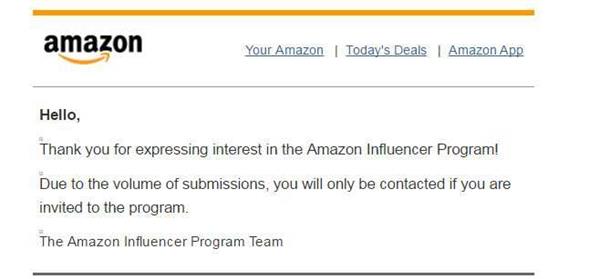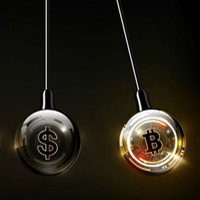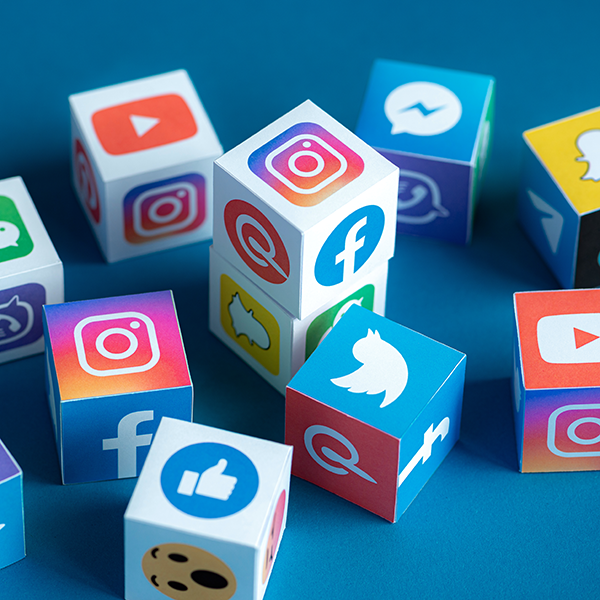Amazon's New Influencer Marketing Program

Social media users are continuing to buy from people, not brands. In fact, when media platform Bloglovin surveyed some 20,000 women recently, more than half said they had bought a product or service due to an influencer post.
For this reason - and a few more we'll go into - Amazon's new Influencer Program (in beta) is an obvious next step for the marketplace (even if we couldn't foresee it).
Influencer marketing takes people that social media users (aka consumers) actively seek out (even interact with frequently) for various reasons ( they follow their blog, they watch them on reality TV, they subscribe to their YouTube channel) and hands them a product to sell. The brand can either give the influencer a script of what to post on its behalf, give them general guidelines, empower them to come up with their own creative or any number of other scenarios to introduce a product or service to that influencer's social followers.
Tracking the return on investment (ROI) from these efforts, finding the 'right' influencers to align a brand with and ensuring everyone follows FTC guidelines are just some of the issues that brands engaged with influencer marketing have faced. Savvy startups have positioned themselves to solve some of these problems, and Amazon's new program may, unfortunately, be yet another case of big tech overtaking these more vulnerable companies - although Amazon will bring new awareness to the marketing strategy.
Other than it being tied to Amazon (and its massive inventory and returning, loyal shoppers), the program is only promising at this point. The self-serve nature of the offering, allows social media influencers to apply and possibly receive an invitation based on their number of social followers, engagement on posts, quality of content and level of relevancy for Amazon.com. From there, one has to imagine that algorithms take over, matching influencers with sellers with some degree of manual approving, denying and monitoring by the sellers themselves.

Once approved, influencers receive a custom URL to introduce their followers to products via social media (this is different than its Amazon Associates program) and earn fees for purchases they drive through their social media platforms. It can be assumed with confidence that Amazon's Influencer Program will provide everyone involved with the analytics needed to successfully measure the ROI of such a campaign ( we encourage you to read, "How to Track Influencer Marketing ROI" to understand how that is currently being done and how Amazon could make that process a whole lot easier since it owns so much of the data already).
Amazon's offering arrives at a near-perfect time in that Instagram - one of the most popular platforms for influencer marketing - now supports links within Instagram Stories for Verified profiles. A social follower can now just 'swipe up' on an influencer's post to visit the Web page being promoted. The alternative was including the text, 'link in bio' and then the follower having to visit the bio, only to then click through - talk about a conversion killer. The image to the right shows the influencer's story and then the landing page that the follower is directed to after 'swiping up.'
With Facebook announcing its own version of Stories, that capability is sure to follow on the world's most active social network.
With any marketing initiative, there are risks involved with Amazon's Influencer Program. There is a good chance that sellers - at some point - will align themselves with an influencer who - at some point - doesn't match their values when they post something inappropriate, close their online persona altogether or market for their direct competition as well. People are unpredictable and social influencers are people who own their accounts and everything they put on it. The rewards most of the time though, outweigh the risks particularly as organic reach on the various networks is dismal and social influencers are able to cut through network algorithms because they are people - not pages - with very active audiences. Other than that, their followers relate to them and trust them (even when they know they are selling something).
If you're at all interested in influencer marketing for your brand, please read this more comprehensive piece, "Influencer Marketing for Everyday Ecommerce Brands."

Subscribe to Our Newsletter!
Latest in Social Media










